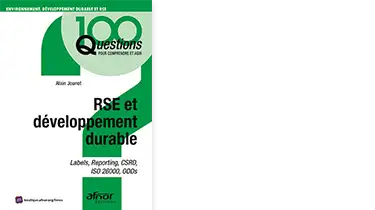
A company’s CSR approach doesn’t end with the definition of a strategy.
It needs to be translated into concrete actions and the effects monitored.
To achieve this, standards provide guidelines and a methodology.
This is the case of the voluntary ISO 26000 standard.
What is ISO 26000?
The voluntary ISO 26000 standard
is the only international standard dedicated to corporate social responsibility. It provides guidelines for adopting socially responsible and environmentally-friendly behavior, by proposing a reading of the subject in 7 central questions. It can be superimposed on the reading grid proposed by the UN’s Sustainable Development Goals (SDGs). In France, economic players are planning to add a voluntary standard to this, providing guidelines for building a European model of sustainable enterprise. You can get a foretaste by watching the replay of a conference on the subject organized by AFNOR in November 2022.
AFNOR Editions’ Interactive Course enables you to quickly understand the NF EN ISO 26000 standard through digital content and concrete examples of its application.
This provides a framework for all types of organization (large corporations, small businesses, local authorities, NGOs, trade unions, etc.), whatever their sector of activity. Thanks to this framework, organizations adopt transparent and ethical behaviors, with the aim of :
- Contribute to sustainable development, including the health and well-being of society
- Taking stakeholders’ expectations into account
- Comply with applicable laws
How to structure your CSR approach using ISO 26000?
The ISO 26000 standard proposes a strategic reference framework in several stages, valid for any CSR approach: identification of the impacts of the organization’s decisions and activities with regard to the central questions of ISO 26000; identification and dialogue with stakeholders.
The ISO 26000 standard invites each organization to frame its approach to corporate responsibility around 7 core issues, so as to identify coherent areas of action and not forget anything along the way: organizational governance, human rights, labor relations and working conditions, the environment, fair practices, consumer issues, communities and local development.
Covid-19, extreme climatic events, the energy crisis… Recent, current and future turbulence proves the importance of taking a disciplined approach. And to do it right, you need to surround yourself with the right people!
What are the sectoral variations of ISO 26000?
The agri-food sector has different needs and expectations from the communications sector: how can a single standard meet these different challenges?
Sectoral reading guides to ISO 26000 have been developed, so that each sector can make the standard its own.
The latest :
ISO 26030, for the food industry
. These are used to award sector-specific labels. This solution, which has been tested with a number of federations, enables the framing of a tailor-made CSR policy.
Since 2018, 18 federations have been chosen to experiment with sector-specific benchmarks, as part of a program steered by the CSR Platform, an offshoot of France Stratégie :
There’s no better way to frame your CSR approach than with a diagnosis and action plan structured around the voluntary ISO 26000 standard. To enhance the value of your corporate social responsibility, consider sector-specific labels! Winegrowing, communications agencies, quarries and building materials… The label for each of these sectors is based on ISO 26000. AFNOR Certification also operates private labels for manufacturers wishing to demonstrate their CSR commitments, such as Responsible Steel for steel and ASI for aluminum via its German subsidiary Gutcert.
